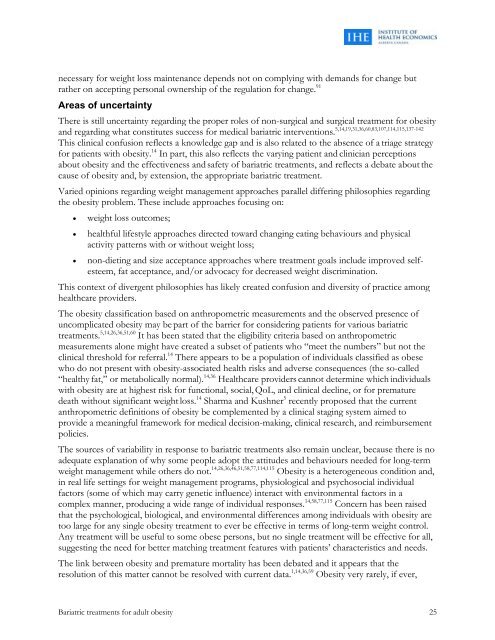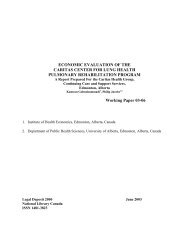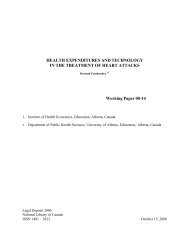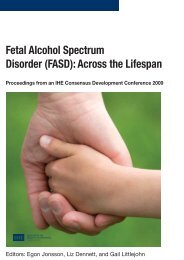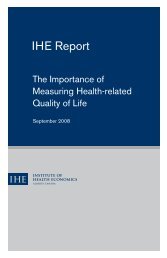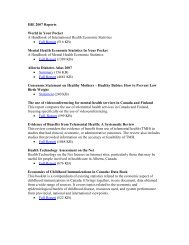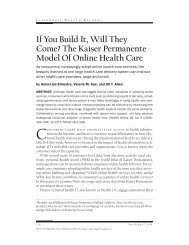Bariatric treatments for adult obesity - Institute of Health Economics
Bariatric treatments for adult obesity - Institute of Health Economics
Bariatric treatments for adult obesity - Institute of Health Economics
- No tags were found...
You also want an ePaper? Increase the reach of your titles
YUMPU automatically turns print PDFs into web optimized ePapers that Google loves.
necessary <strong>for</strong> weight loss maintenance depends not on complying with demands <strong>for</strong> change butrather on accepting personal ownership <strong>of</strong> the regulation <strong>for</strong> change. 91Areas <strong>of</strong> uncertaintyThere is still uncertainty regarding the proper roles <strong>of</strong> non-surgical and surgical treatment <strong>for</strong> <strong>obesity</strong>and regarding what constitutes success <strong>for</strong> medical bariatric interventions. 5,14,19,31,36,60,83,107,114,115,137-142This clinical confusion reflects a knowledge gap and is also related to the absence <strong>of</strong> a triage strategy<strong>for</strong> patients with <strong>obesity</strong>. 14 In part, this also reflects the varying patient and clinician perceptionsabout <strong>obesity</strong> and the effectiveness and safety <strong>of</strong> bariatric <strong>treatments</strong>, and reflects a debate about thecause <strong>of</strong> <strong>obesity</strong> and, by extension, the appropriate bariatric treatment.Varied opinions regarding weight management approaches parallel differing philosophies regardingthe <strong>obesity</strong> problem. These include approaches focusing on:weight loss outcomes;healthful lifestyle approaches directed toward changing eating behaviours and physicalactivity patterns with or without weight loss;non-dieting and size acceptance approaches where treatment goals include improved selfesteem,fat acceptance, and/or advocacy <strong>for</strong> decreased weight discrimination.This context <strong>of</strong> divergent philosophies has likely created confusion and diversity <strong>of</strong> practice amonghealthcare providers.The <strong>obesity</strong> classification based on anthropometric measurements and the observed presence <strong>of</strong>uncomplicated <strong>obesity</strong> may be part <strong>of</strong> the barrier <strong>for</strong> considering patients <strong>for</strong> various bariatric<strong>treatments</strong>. 5,14,26,36,51,60 It has been stated that the eligibility criteria based on anthropometricmeasurements alone might have created a subset <strong>of</strong> patients who “meet the numbers” but not theclinical threshold <strong>for</strong> referral. 14 There appears to be a population <strong>of</strong> individuals classified as obesewho do not present with <strong>obesity</strong>-associated health risks and adverse consequences (the so-called“healthy fat,” or metabolically normal). 14,36 <strong>Health</strong>care providers cannot determine which individualswith <strong>obesity</strong> are at highest risk <strong>for</strong> functional, social, QoL, and clinical decline, or <strong>for</strong> prematuredeath without significant weight loss. 14 Sharma and Kushner 5 recently proposed that the currentanthropometric definitions <strong>of</strong> <strong>obesity</strong> be complemented by a clinical staging system aimed toprovide a meaningful framework <strong>for</strong> medical decision-making, clinical research, and reimbursementpolicies.The sources <strong>of</strong> variability in response to bariatric <strong>treatments</strong> also remain unclear, because there is noadequate explanation <strong>of</strong> why some people adopt the attitudes and behaviours needed <strong>for</strong> long-termweight management while others do not. 14,26,36,46,51,58,77,114,115 Obesity is a heterogeneous condition and,in real life settings <strong>for</strong> weight management programs, physiological and psychosocial individualfactors (some <strong>of</strong> which may carry genetic influence) interact with environmental factors in acomplex manner, producing a wide range <strong>of</strong> individual responses. 14,58,77,115 Concern has been raisedthat the psychological, biological, and environmental differences among individuals with <strong>obesity</strong> aretoo large <strong>for</strong> any single <strong>obesity</strong> treatment to ever be effective in terms <strong>of</strong> long-term weight control.Any treatment will be useful to some obese persons, but no single treatment will be effective <strong>for</strong> all,suggesting the need <strong>for</strong> better matching treatment features with patients’ characteristics and needs.The link between <strong>obesity</strong> and premature mortality has been debated and it appears that theresolution <strong>of</strong> this matter cannot be resolved with current data. 1,14,36,59 Obesity very rarely, if ever,<strong>Bariatric</strong> <strong>treatments</strong> <strong>for</strong> <strong>adult</strong> <strong>obesity</strong> 25


